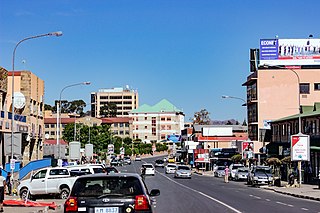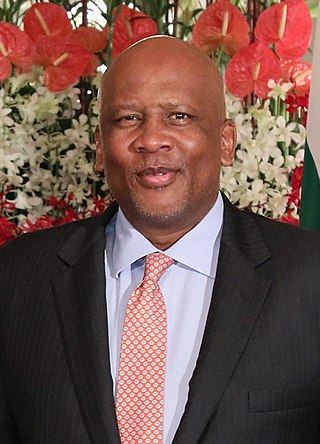Twenty-first century
Years in Africa | |
|---|---|
| Sovereign states |
|
States with limited recognition | |
Dependencies and other territories |
|
This is a timeline of History of Lesotho . Each article deals with events in Lesotho in a given year.

Lesotho, formally the Kingdom of Lesotho, is a landlocked country in Southern Africa. As an enclave of South Africa, with which it shares a 1,106 km border, it is the only sovereign enclave in the world outside of the Italian Peninsula. It is situated in the Maloti Mountains and contains the highest peak in Southern Africa. It has an area of over 30,000 km2 (11,600 sq mi) and has a population of about 2 million. Its capital and largest city is Maseru.

The history of people living in the area now known as Lesotho goes back as many as 400 years. Present Lesotho emerged as a single polity under King Moshoeshoe I in 1822. Under Moshoeshoe I, Basotho joined other clans in their struggle against the Lifaqane associated with famine and the reign of Shaka Zulu from 1818 to 1828.

The economy of Lesotho is based on agriculture, livestock, manufacturing, mining, and depends heavily on inflows of workers’ remittances and receipts from the Southern African Customs Union (SACU). Lesotho is geographically surrounded by South Africa and is economically integrated with it as well. The majority of households subsist on farming. The formal sector employment consist of mainly female workers in the apparel sector. While male migrant laborers work primarily as miners in South Africa for 3 to 9 months and employment in the Government of Lesotho (GOL). Half of the country's population work in informal crop cultivation or animal husbandry.

Maseru is the capital and largest city of Lesotho. It is also the capital of the Maseru District. Located on the Caledon River, Maseru lies directly on the Lesotho–South Africa border. Maseru had a population of 330,760 in the 2016 census. The city was established as a police camp and assigned as the capital after the country became a British protectorate in 1869. When the country achieved independence in 1966, Maseru retained its status as capital. The name of the city is a Sesotho word meaning "red sandstones".
SothoSesotho, also known as Southern Sotho or Sesotho sa Borwa is a Southern Bantu language of the Sotho–Tswana ("S.30") group, spoken in Lesotho, and South Africa where it is an official language;

Letsie III is King of Lesotho. He succeeded his father, Moshoeshoe II, who was forced into exile in 1990. His father was briefly restored in 1995 but died in a car crash in early 1996, and Letsie became king again. As a constitutional monarch, most of King Letsie's duties as monarch of Lesotho are ceremonial. In 2000, he declared HIV/AIDS in Lesotho to be a natural disaster, prompting immediate national and international response to the epidemic.

The Sotho, also known as the Basotho, are a prominent Sotho-Tswana ethnic group with roots in Southern Africa. They primarily inhabit the regions of Lesotho and South Africa.

The Lesotho National Football Team, also known as LNFT represents Lesotho in Men's international Association Football and is governed by the Lesotho Football Association.

The Lesotho Highlands Water Project (LHWP) is an ongoing water supply project with a hydropower component, developed in partnership between the governments of Lesotho and South Africa. It comprises a system of several large dams and tunnels throughout Lesotho and delivers water to the Vaal River System in South Africa. In Lesotho, it involves the rivers Malibamatso, Matsoku, Senqunyane, and Senqu. It is Africa's largest water transfer scheme.

Lesotho first participated at the Olympic Games in 1972 and has sent athletes to compete in every Summer Olympic Games since then, except when they boycotted the 1976 Summer Olympics along with most other African nations. Lesotho has never participated in the Winter Olympic Games.

Lesotho–United States relations are bilateral relations between the Kingdom of Lesotho and the United States of America.
Education in Lesotho has undergone reforms in recent years, meaning that primary education is now free, universal, and compulsory.

HIV/AIDS in Lesotho constitutes a very serious threat to Basotho and to Lesotho's economic development. Since its initial detection in 1986, HIV/AIDS has spread at alarming rates in Lesotho. In 2000, King Letsie III declared HIV/AIDS a natural disaster. According to the Joint United Nations Programme on HIV/AIDS (UNAIDS) in 2016, Lesotho's adult prevalence rate of 25% is the second highest in the world, following Eswatini.

The People's Republic of China and Lesotho maintain historical, political, economic, trade, aid, healthcare and migration connections.

A foreign national wishing to enter Lesotho must obtain a visa unless they are a citizen of one of the eligible visa exempt countries.

Basotho cuisine features African traditions and British influence. Lesotho is surrounded by South Africa and it shares culinary practices with its neighbor.
The Military ranks of Lesotho are the military insignia used by the Lesotho Defence Force. Being a landlocked country and an enclave surrounded entirely by South Africa, Lesotho does not have a navy.
The COVID-19 pandemic in Lesotho is part of the ongoing worldwide pandemic of coronavirus disease 2019 caused by severe acute respiratory syndrome coronavirus 2. The virus was confirmed to have reached Lesotho on 13 May 2020.